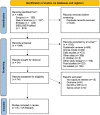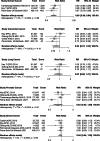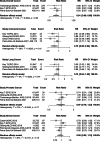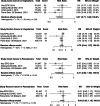Association of meat, vegetarian, pescatarian and fish-poultry diets with risk of 19 cancer sites and all cancer: findings from the UK Biobank prospective cohort study and meta-analysis
- PMID: 35655214
- PMCID: PMC9281076
- DOI: 10.1186/s12916-022-02257-9
Association of meat, vegetarian, pescatarian and fish-poultry diets with risk of 19 cancer sites and all cancer: findings from the UK Biobank prospective cohort study and meta-analysis
Abstract
Background: The associations of cancer with types of diets, including vegetarian, fish, and poultry-containing diets, remain unclear. The aim of this study was, therefore, to investigate the association of type of diet with all cancers and 19 site-specific incident cancers in a prospective cohort study and then in a meta-analysis of published prospective cohort studies.
Methods: A total of 409,110 participants from the UK Biobank study, recruited between 2006 and 2010, were included. The outcomes were incidence of all cancers combined and 19 cancer sites. Associations between the types of diets and cancer were investigated using Cox proportional hazards models. Previously published prospective cohort studies were identified from four databases, and a meta-analysis was conducted using random-effects models.
Results: The mean follow-up period was 10.6 years (IQR 10.0; 11.3). Compared with meat-eaters, vegetarians (hazard ratio (HR) 0.87 [95% CI: 0.79 to 0.96]) and pescatarians (HR 0.93 [95% CI: 0.87 to 1.00]) had lower overall cancer risk. Vegetarians also had a lower risk of colorectal and prostate cancers compared with meat-eaters. In the meta-analysis, vegetarians (Risk Ratio (RR): 0.90 [0.86 to 0.94]) and pescatarians (RR 0.91 [0.86; 0.96]) had lower risk of overall and colorectal cancer. No associations between the types of diets and prostate, breast, or lung cancers were found.
Conclusions: Compared with meat-eaters, vegetarians and pescatarians had a lower risk of overall, colorectal, and prostate cancer. When results were pooled in a meta-analysis, the associations with overall and colorectal cancer persisted, but the results relating to other specific cancer sites were inconclusive.
Keywords: Cancer; Diet; Pescatarian; Vegetarians.
© 2022. The Author(s).
Conflict of interest statement
The authors declare that they have no competing interests.
Figures





References
-
- Negri E, Franceschi S, Parpinel M, La Vecchia C. Fiber intake and risk of colorectal cancer. Cancer Epidemiol Prev Biomarkers. 1998;7(8):667–671. - PubMed
Publication types
MeSH terms
Grants and funding
LinkOut - more resources
Full Text Sources
Medical

